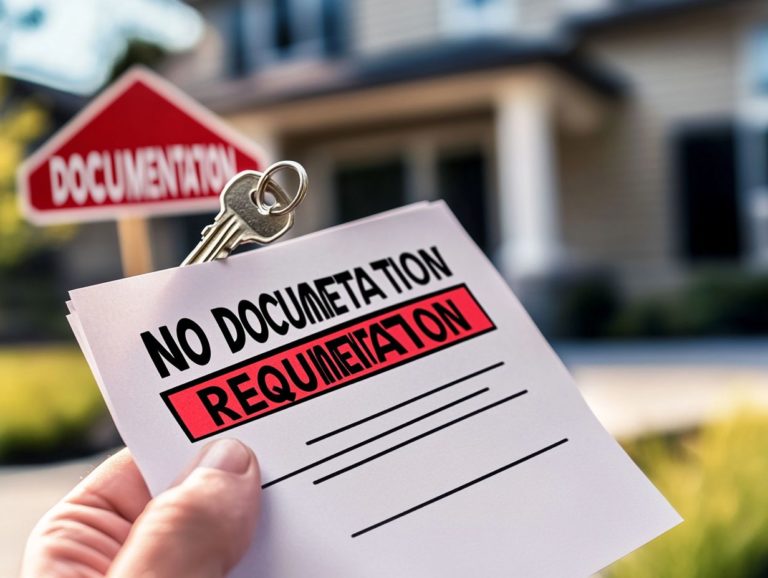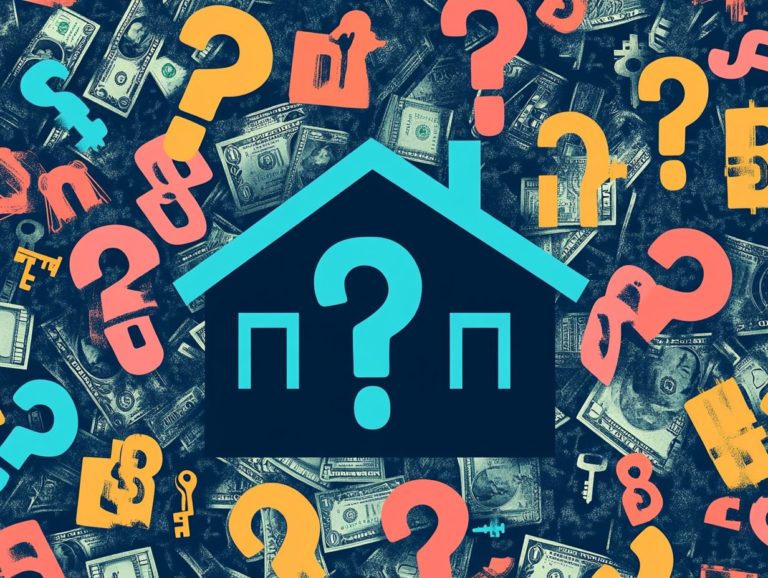5 Hidden Costs of Buying a Home
Buying a home marks an exhilarating milestone. However, it also brings a plethora of hidden costs that can surprise even the most astute buyers.
Consider the closing costs, property taxes, ongoing maintenance, and those pesky unexpected repairs. These expenses can dramatically affect your budget.
This article delves into 15 essential hidden costs every homebuyer should be aware of, paired with strategies on how to prepare, save, and budget wisely. Understanding these costs helps you make informed decisions as you embark on your journey into homeownership.
Contents
- Key Takeaways:
- 1. Closing Costs
- 2. Home Inspection Fees
- 3. Property Taxes
- 4. Maintenance and Repairs
- 5. Homeowners Insurance
- 6. Private Mortgage Insurance (PMI)
- 7. Homeowners Association (HOA) Fees
- 8. Utilities and Home Services
- 9. Moving Expenses
- 10. Renovations and Upgrades
- 11. Home Warranty
- 12. Property Appraisal Fees
- 13. Landscaping and Outdoor Maintenance
- 14. Pest Control
- 15. Furniture and Decor
- What Are Some Ways to Save on These Hidden Costs?
- Frequently Asked Questions
Key Takeaways:
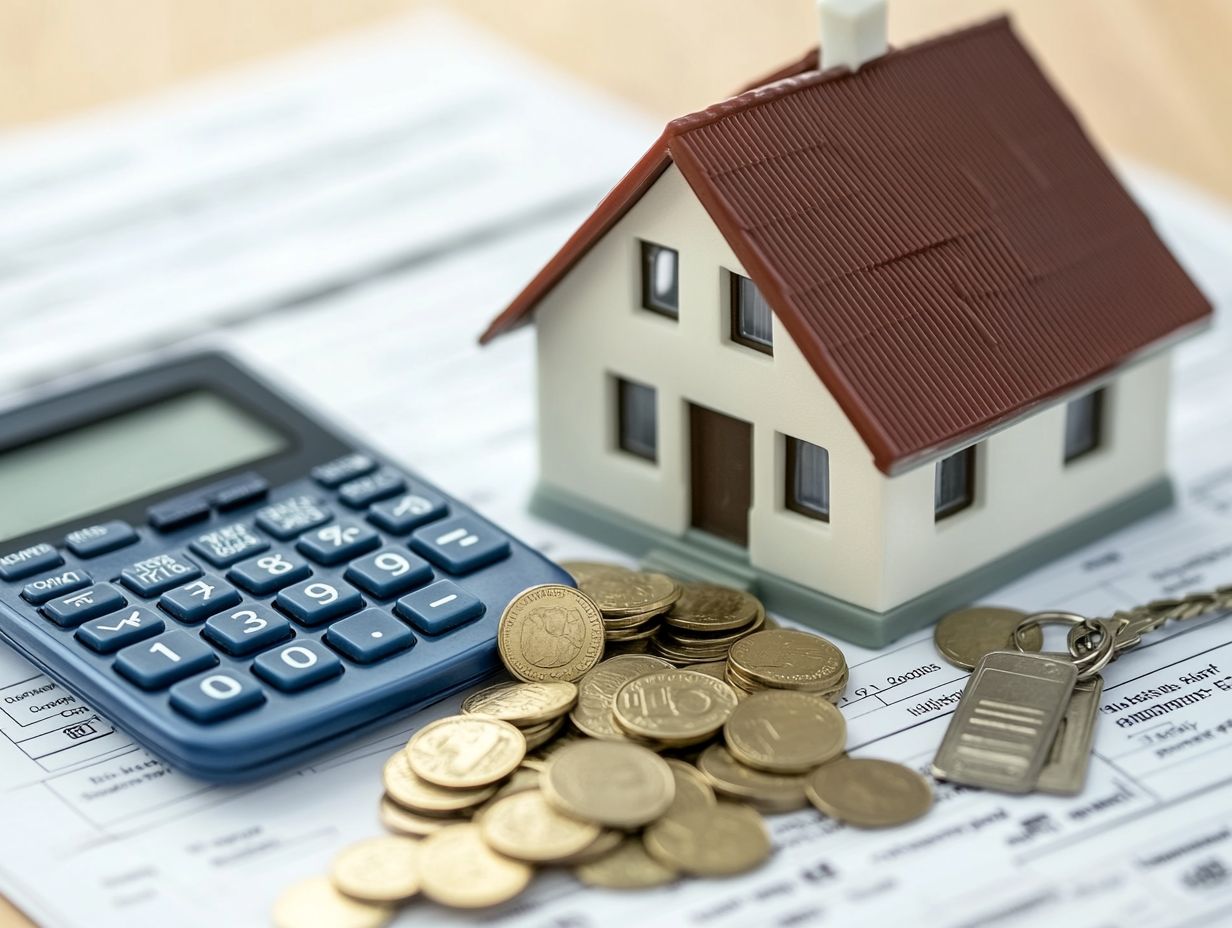
Closing costs can add up to thousands of dollars, so make sure to budget for them when buying a home. Don’t overlook home inspection fees, as they can uncover costly issues that may impact your budget down the line. Property taxes are an ongoing expense that can increase over time, so be sure to research the rates in the area before purchasing a home.
1. Closing Costs
Closing costs are a critical yet frequently overlooked aspect of purchasing a home. They encompass a variety of fees that arise during the finalization of your mortgage loan. These expenses can significantly influence your overall budget and include the fee for processing your mortgage, title insurance, and attorney fees.
You may need to provide an earnest money deposit, which is a deposit to show you’re serious about buying the home. It can vary depending on the property’s price and market conditions. Don t wait! Consult a knowledgeable real estate agent today to avoid costly surprises.
Closing costs vary widely by region. In some areas, higher property taxes or unique local fees may apply. You might also face expenses like these:
- Appraisal fees
- Home inspection costs
- Prepaid property taxes or insurance
To ease the burden of these fees, consider asking lenders about the possibility of negotiating certain charges. Understanding which costs are negotiable allows you to compare offers more effectively. Including these anticipated expenses in your overall home-buying budget is crucial. They can quickly add up to thousands of dollars, transforming a seemingly affordable home into a far more expensive investment.
A great real estate agent can be your best ally in navigating these costs!
2. Home Inspection Fees
Home inspection fees are an essential aspect of the home buying journey. They offer you a comprehensive analysis of the property’s condition, which is particularly vital when you’re securing a mortgage.
Knowing what a home inspection typically entails such as evaluations of the roof, plumbing, electrical systems, and structural integrity allows you to appreciate the value of this process. A home inspection reveals hidden issues that might otherwise slip under your radar, saving you from unexpected repair expenses down the line.
Inspection fees can vary widely based on factors like the size and age of the property, reflecting the complexities involved in assessing older homes versus new builds.
By identifying potential repairs early on, you equip yourself to make informed decisions, negotiate necessary repairs, or even rethink the purchase altogether. This approach ultimately ensures that you re making a wise investment in your new home.
3. Property Taxes
Property taxes are a crucial factor to consider as you navigate the journey of becoming a homeowner. They can significantly influence not just your monthly mortgage payments but also your overall budget when acquiring a new house.
The assessment of these taxes typically depends on the property’s assessed value, which local government agencies determine by evaluating various elements such as the home’s location, size, condition, and comparable sales in the vicinity.
Local regulations and tax codes can lead to noticeable differences in rates from one municipality to another. Your ongoing costs may vary significantly based on where your property is located.
This can profoundly impact your cash offers and mortgage approval. A higher property tax burden might affect your affordability and overall financial stability, ultimately shaping your decisions in the competitive real estate market.
4. Maintenance and Repairs
Ongoing maintenance and emergency repairs are important parts of homeownership that can significantly impact your expenses and overall financial well-being.
Anticipating a variety of maintenance tasks is essential, as they often change with the seasons and specific needs. For example, consider:
- Gutter cleaning in the fall
- Servicing your HVAC system before summer heat
- Inspecting your roof after winter storms
Unexpected repairs like plumbing leaks, electrical issues, or appliance malfunctions can arise at the most inconvenient times, making it vital to have a proactive plan.
To budget effectively for these inevitable expenses, set aside a dedicated fund. Experts recommend saving about 1-3% of your home s value each year.
Building an emergency fund can relieve financial stress and give you peace of mind when unexpected repairs occur.
5. Homeowners Insurance
Homeowners insurance is essential for you as a property owner, offering vital coverage against potential damages and unexpected events after purchasing a home.
This type of insurance typically covers various incidents, including damage from fire, theft, and certain natural disasters, allowing you to recover financially when misfortunes arise.
Premiums are calculated based on several factors, including your home’s location, age, construction type, and your claims history. External influences, like the local crime rate and weather patterns, can also significantly impact your costs.
It’s crucial to shop around and compare different policies to secure the best coverage for your needs. Insufficient insurance could lead to significant financial loss in a disaster, so taking time to find the right policy is worth the effort.
6. Private Mortgage Insurance (PMI)
Private mortgage insurance (PMI) is often necessary for buyers who choose a mortgage loan with a down payment of less than 20%. This requirement can significantly impact your monthly mortgage payment.
PMI protects lenders in case of borrower default, making it an unavoidable cost for those entering the housing market without substantial savings. For many, this insurance translates into an additional monthly expense, affecting overall loan terms and financial planning.
To alleviate these costs, consider strategies such as:
- Increasing your down payment to at least 20%
- Making cash offers
Both options can eliminate the need for PMI entirely. It’s crucial to weigh these alternatives carefully. While avoiding PMI saves money in the short term, putting more cash down could compromise your liquidity, leading to potential long-term financial implications.
7. Homeowners Association (HOA) Fees
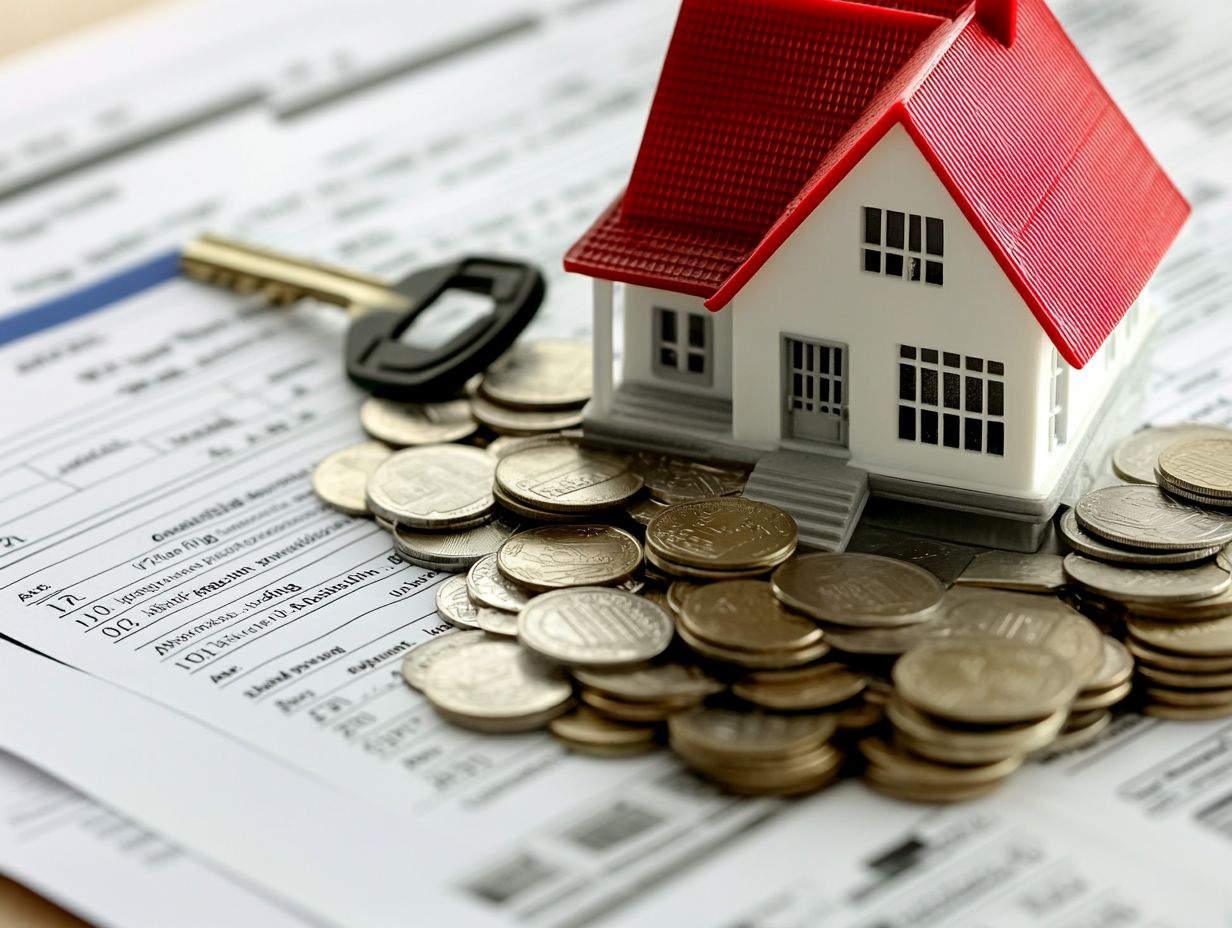
Homeowners association (HOA) fees are common in many communities, covering shared amenities and services while contributing to the overall cost of homeownership. These fees can include expenses for maintaining common areas, landscaping, security services, and recreational facilities like pools and gyms.
You’ll notice that the amount varies significantly between neighborhoods, influenced by the level of luxury and the services offered. For example, a gated community may charge higher fees due to enhanced security and premium amenities, while a smaller development might have lower fees for basic services.
You must understand these costs now to avoid surprises later! Understanding these financial obligations will enable you to make informed decisions and steer clear of unexpected expenses that could arise later on.
8. Utilities and Home Services
Utility bills are an ongoing expense you must budget for. They cover essential services like electricity, water, and internet access.
Gas, trash collection, and cable services can also impact your monthly expenses. Understanding these categories helps you create a complete overview of your obligations.
To estimate these costs accurately, review past bills. Consider seasonal fluctuations and any upcoming changes in your family size or lifestyle.
Effective expense management might include:
- Setting up automatic payments to avoid late fees,
- Utilizing budgeting apps to track your consumption,
- Making a conscious effort to implement energy-saving habits.
Incorporating utility costs into your overall household budget is essential for maintaining your financial health.
9. Moving Expenses
Moving expenses can significantly affect your financial plan when purchasing a home. They cover everything from hiring a moving company to transportation and packing supplies.
Explore your options carefully. You can either hire professional movers or take the DIY route.
Each option has unique costs, such as labor fees and truck rentals. If you choose professional help, gather multiple quotes to find a service that fits your budget.
If you opt for DIY, plan for hidden costs like furniture storage or equipment rentals. Setting aside a contingency fund for unexpected expenses can ease financial stress.
10. Renovations and Upgrades
Renovations can elevate the value and comfort of your new home. Approach them with a clear budget to avoid overspending.
As a new homeowner, you may consider popular renovations like kitchen remodels and bathroom upgrades. Energy-efficient windows are also a great option.
Costs for these improvements vary widely. For example, a kitchen renovation could range from $10,000 to $50,000, depending on the scope and materials.
Create a comprehensive budget that includes labor and materials, while allowing for unexpected costs. Well-planned upgrades can provide a substantial return on investment.
Remember, these renovations transform your home into a more valuable asset.
11. Home Warranty
A home warranty offers peace of mind as a new homeowner. It covers unexpected repairs to major systems and appliances.
By shielding you from repair costs, a home warranty can be invaluable. It typically covers significant components like HVAC systems and kitchen appliances.
The annual cost usually ranges from $300 to $600, depending on coverage. Many view it as a smart investment against unforeseen system failures.
Incorporating a home warranty into your budget can ease cash flow concerns. It serves as a safety net, ensuring unexpected repairs won t derail your financial stability.
12. Property Appraisal Fees
Property appraisal fees are crucial in the home buying journey. They determine the fair market value of a house and can affect loan amounts.
Larger, more intricate properties in busy areas usually have higher appraisal costs compared to simpler homes in rural settings. Factor these fees into your budget to avoid surprises during the purchase.
A low appraisal can have serious consequences. It may lead to reduced loan approvals or require you to renegotiate the purchase price, complicating your path to homeownership.
13. Landscaping and Outdoor Maintenance
Landscaping enhances your home’s curb appeal but requires careful budgeting. Meticulous planning helps you avoid unexpected costs.
You might juggle tasks like lawn care, tree pruning, and seasonal activities like mulching. Each task has its cost mowing is budget-friendly, but intricate landscaping can get expensive.
Regular maintenance prolongs the life of your outdoor spaces. Schedule it to prevent larger costs in the future.
Plan your landscaping budget thoughtfully. This ensures a beautiful and functional landscape.
14. Pest Control
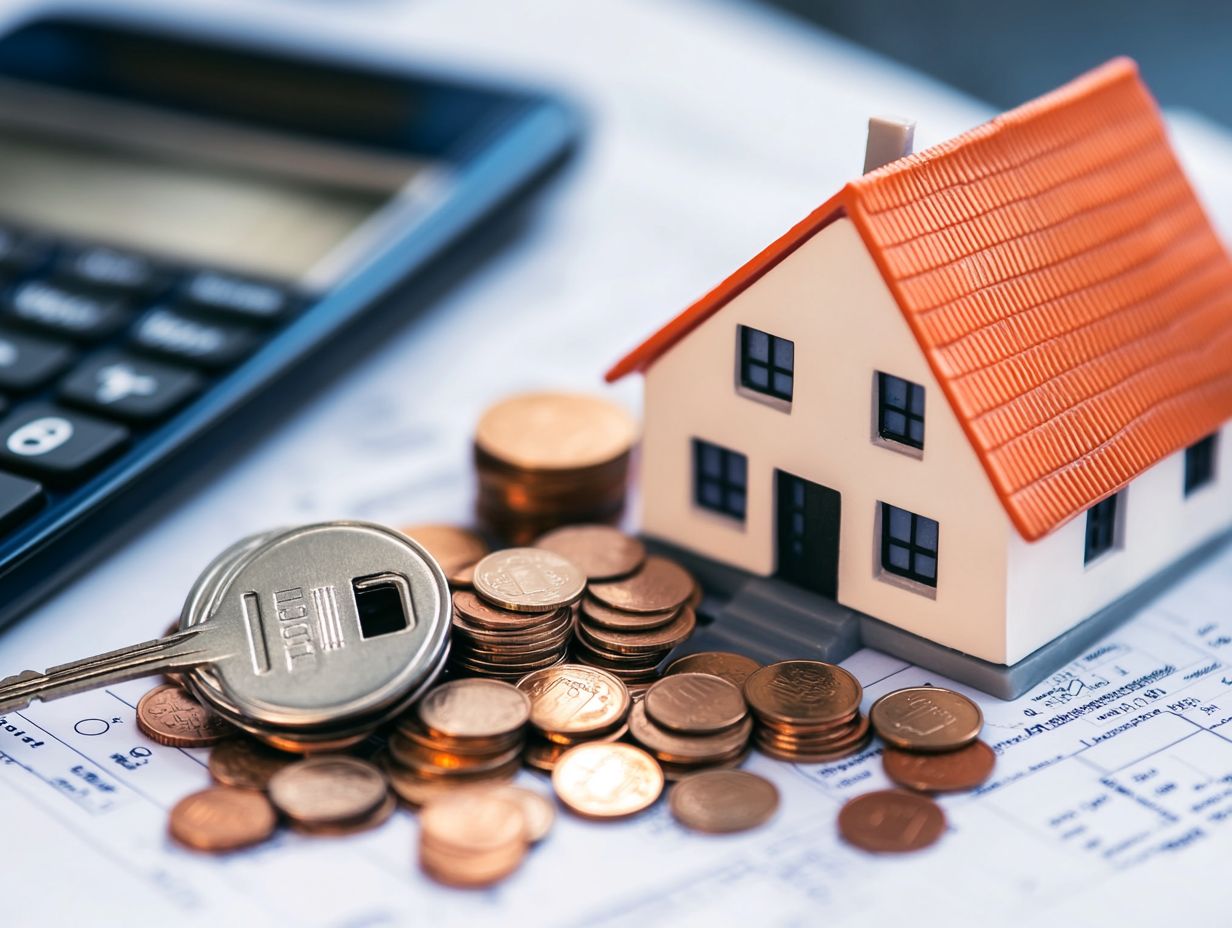
Pest control is often an overlooked expense. Include it in your maintenance plan to avoid costly repairs.
Regular inspections help you catch infestations early, saving you money in the long run. They prevent structural damage and health risks.
The cost of pest control varies based on the issue and treatment needed. Initial inspections typically range from $75 to $150.
To budget for pest control, set aside a small monthly amount. This way, it becomes a regular part of your home maintenance routine.
15. Furniture and Decor
Investing in furniture and decor personalizes your home but can quickly add up. Careful planning is essential to manage your budget.
Distinguish between necessities, like a cozy sofa, and extras that elevate aesthetics but aren t essential. This helps you allocate funds wisely.
Consider affordable options like thrift stores and seasonal sales. These can lead to significant savings.
Making intentional choices enhances comfort and beauty without financial strain. Create a welcoming atmosphere that reflects your personal style.
What Are Some Ways to Save on These Hidden Costs?
Saving on hidden costs is crucial for prospective homeowners. It ensures a more manageable budget for your dream home.
Explore strategies to lower your financial burden. For example, negotiate fees with lenders and agents for substantial savings.
Research property taxes and costs in your chosen neighborhood to avoid surprises. Create a detailed budget to account for all potential expenses.
This approach maximizes your savings and allows you to enjoy your new investment fully.
How Can a Homebuyer Prepare for These Costs?
Preparation is your secret weapon as a homebuyer. It allows you to manage the many costs associated with purchasing a house. This enables you to craft a realistic budget that encompasses all potential expenses.
To begin, dive deep into researching local costs. These costs can vary widely depending on the neighborhood and current market trends. By scrutinizing property tax rates, utility expenses, and homeowner association fees, you ll gain a clearer picture of the financial landscape ahead.
Engage with knowledgeable real estate agents; their insights into common expenses encountered during the buying process are invaluable. Set aside a contingency fund to prepare for unexpected costs, such as repairs or closing fees that might otherwise surprise first-time buyers.
What Are the Long-Term Financial Implications of These Hidden Costs?
Understanding the long-term financial implications of hidden costs is crucial for you as a homeowner. This insight allows you to maintain a stable expenses budget and avoid unnecessary financial strain.
These hidden costs can encompass maintenance, property taxes, and insurance adjustments, which often slip under the radar during the initial buying process. Over time, these incremental expenses can accumulate, leading to significant financial burdens that could derail your future plans.
For instance, an unexpected spike in property taxes or a major repair can tighten your household budget more than you anticipated. It s important to consider these factors carefully when evaluating the overall affordability of a home, ensuring you are well-prepared for both immediate and long-term financial commitments.
How Can a Homebuyer Budget for These Costs?
A well-structured budget is essential for you as a homebuyer. It allows you to effectively manage the hidden costs that often surface during the home buying journey, ensuring your financial readiness and peace of mind.
To achieve this, consider not just your mortgage payment but also related expenses such as property taxes, homeowners insurance, and maintenance costs. By incorporating these elements, you ll gain a clearer understanding of your overall financial obligations.
Setting aside a contingency fund can be a game-changer. It helps you accommodate any unexpected repairs or sudden shifts in your financial circumstances that may occur during homeownership.
This adaptable approach to budgeting enables you to prepare for future uncertainties while paving the way for smarter financial decisions in the long run.
What Are Some Common Oversights When Budgeting for a Home Purchase?
Many homebuyers overlook crucial aspects when budgeting for a home purchase. They often miss expenses that can significantly affect their overall financial landscape.
For instance, you might underestimate property taxes, which can vary widely based on location and the type of home you choose.
Additionally, moving costs such as hiring movers, purchasing packing supplies, and setting up utilities can accumulate quickly, leading to unexpected financial pressure.
To sidestep these pitfalls, conduct thorough research and create a comprehensive budget that accounts for all potential expenses. Consulting with real estate professionals and utilizing online calculators can shed light on costs that often slip through the cracks, ensuring a smoother and more financially secure transition into homeownership.
Frequently Asked Questions
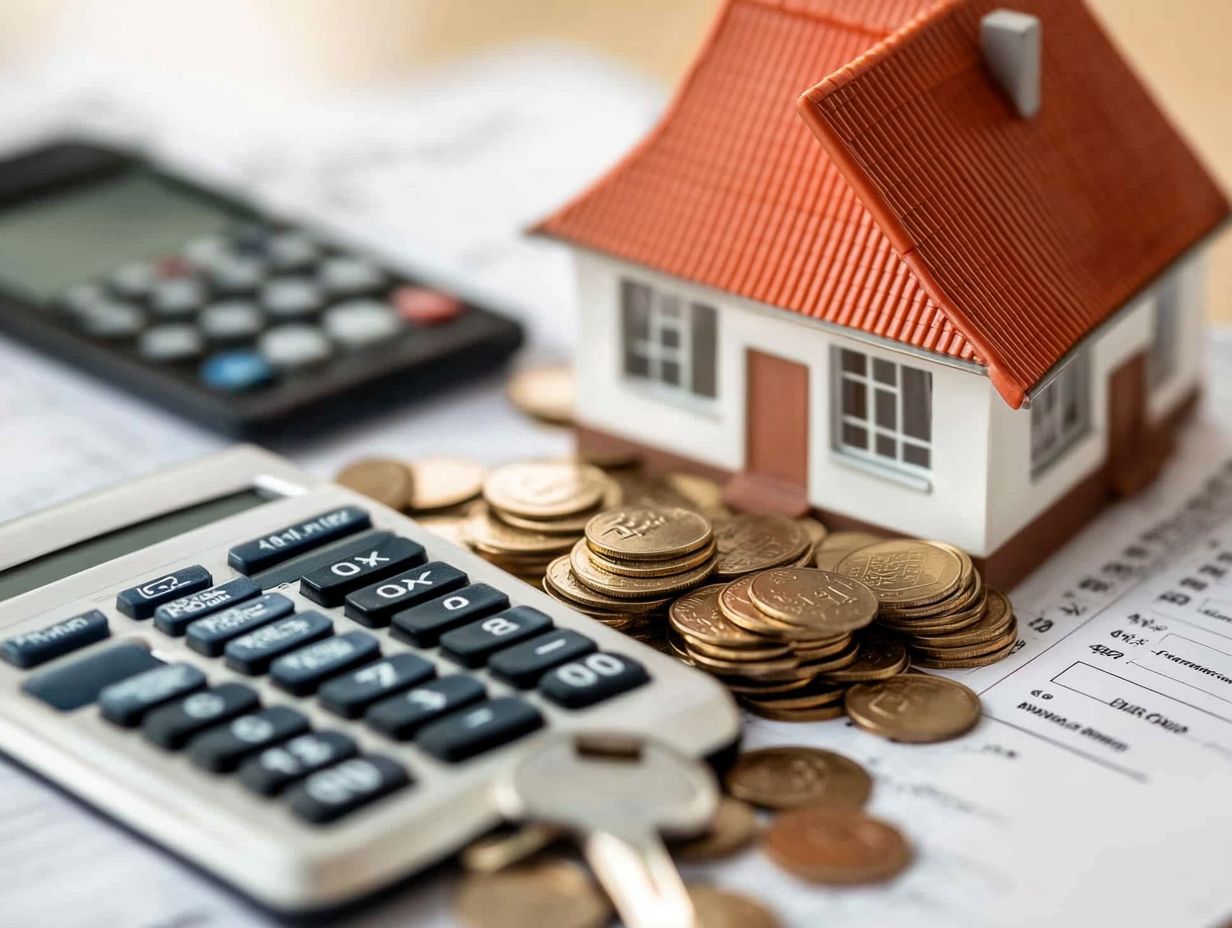
What Are the 5 Hidden Costs of Buying a Home?
The 5 hidden costs of buying a home include closing costs, property taxes, homeowners insurance, home maintenance and repairs, and homeowner association fees.
What Should I Know About Closing Costs?
Closing costs are the fees associated with the purchase of a home, such as appraisal fees, title insurance, and attorney fees. These costs can add up to 2-5% of the total purchase price of the home.
How Much Are Property Taxes?
Property taxes vary depending on the location of the home. They are typically calculated as a percentage of the home’s assessed value. This cost can range from a few hundred to several thousand dollars per year.
Start budgeting now to avoid future stress! Download our budgeting checklist or contact a real estate agent for more personalized advice.
What is homeowners insurance?
Homeowners insurance protects your home from damage or loss. You usually pay for it once a year, and costs can range from a few hundred to a few thousand dollars.
What are home maintenance and repair costs?
Home maintenance includes tasks like lawn care and pest control. You should definitely budget at least 1% of your home’s value for unexpected repairs like a leaky roof or broken appliance each year.
What are homeowners association fees?
Homeowners association fees, or HOA fees, are paid monthly or annually to support community amenities and maintenance. These fees can vary widely, costing anywhere from a few hundred to a few thousand dollars each year.

